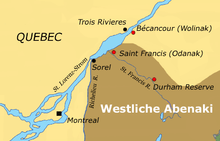
Abenaki
The Abenaki (Abnaki, Alnôbak) are a Native American tribe and a First Nations band government. They are one of the Algonquian-speaking peoples of northeastern North America. The Abenaki live in Quebec and the Maritimes of Canada and in the New England region of the United States, a region called Wabanahkik ("Dawn Land") in the Eastern Algonquian languages. The Abenaki are one of the five members of the Wabanaki Confederacy. "Abenaki" is a linguistic and geographic grouping; historically there was not a strong central authority, but as listed below a large number of smaller bands and tribes who shared many cultural traits, and who came together as a post-contact community after their original tribes were decimated by colonization, warfare and disease.
Name
The word Abenaki, and its syncope, Abnaki, are both derived from Wabanaki, or Wôbanakiak, meaning "People of the Dawn Land" in the Abenaki language. However, while the two terms are often confused, the Abenaki are just one of the tribes in the Wabanaki Confederacy.

Abenaki language
Abenaki, or Abnaki, is a nearly extinct Algonquian language of Quebec and Maine. There were two varieties, Eastern and Western, which differ in vocabulary and phonology, and are sometimes considered distinct languages.
Eastern Abenaki was spoken by several peoples, of which the last were the Penobscot of coastal Maine. The last known speaker, Madeline Shay, died in 1993 in Penobscot, Maine. Other dialects of Eastern Abenaki, such as Caniba and Aroosagunticook, are documented in French-language materials from the colonial period.
In 1991, Western Abenaki was spoken by 20 individuals along the St. Lawrence River between Montreal and Quebec City, mostly at Odanak, the site of the former mission village of St. Francis, and by about 50 individuals living throughout New York state and Connecticut. By 2006 five speakers were recorded.
History
In Reflections in Bullough's Pond, historian Diana Muir argues that Abenaki neighbors, the pre-contact Iroquois, were an imperialist, expansionist culture whose cultivation of the corn/beans/squash agricultural complex enabled them to support a large population. They made war primarily against neighboring Algonquian peoples, including the Abenaki. Muir uses archaeological data to argue that the Iroquois expansion onto Algonquian lands was checked by the Algonquian adoption of agriculture. This enabled them to support their own populations large enough to have sufficient warriors to defend against the threat of Iroquois conquest.
Podcasts:

-
by Japunga
-
by Japunga
-
by Japunga
-
by Japunga
-
by Japunga
-
by Japunga
-
by Japunga
You Ain't Nothing
by: JapungaWhat the fuck is up with this?
You want to live for nothing with a fucked disease
It doesn't make a difference can you believe
Only one condition that I'm not alone
I will do it what it takes
You want to be alive
It don't take much to be
I know that I will survive
Try taking something from me
You ain't nothing
Keep coming back
You ain't nothing
What's the use in bringing me
Bringing me this far to leave me in the dark
You drag me like I've never seen the dark in my life
I close my eyes I hold my breath I'm at the end
Have you got what it takes?
Life is set to death
From the very moment you breathe
Living lies on a needle
Taking life out on me
You ain't nothing
Keep coming back
You ain't nothing
